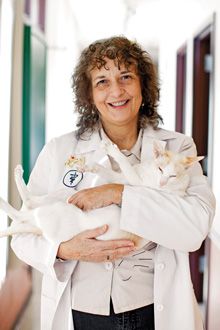Why all the fuss about low-cost veterinary clinics?
We agree that spaying and neutering pets is a good thing. Stop being so concerned about who provides the service.

Dr. Joan Freesh educates her clients on the medical differences between a low-cost spay or neuter and a spay or neuter at her St. Louis Cat Clinic. The choice after that is theirs. (Photo courtesy of Dr. Joan Freesh)My cat clinic in St. Louis, Missouri, sits in a large metropolitan area with an ever-increasing number of nonprofit organizations offering low-cost spays and neuters. The organizations are staffed with well-meaning volunteers and employees. They are well-funded with donations, and they can operate tax-free.
I don't know that any of these organizations require proof from pet owners that they can't afford a spay or neuter at a private or corporate veterinary practice. I applaud those facilities in other states that require proof of ability to pay. Those facilities are honestly assisting people who need financial assistance. Good for them and for the pets that need their help! That's how it should be. That should be the reason for the low-cost spay-neuter option.
Unfortunately, low-cost spay-neuter providers that do not require proof of financial need aren't really reaching the people and pets most in need. From what I see, they mostly provide services to clients who actually can afford a private or corporate veterinary practice spay or neuter. These organizations claim to be helping our country's pet overpopulation crisis. Are the organizations deluding themselves and the public? Do they even care? I don't know.
Low-cost vs. your clinic: What's the difference?
Last year when I visited my dentist, the dental assistant of more than 20 years told me with a grin that she'd had her new dog spayed at a low-cost facility. I had no doubt that she could afford her regular veterinarian's fee.
This woman probably believed-like most of the pet-owning population-that all spay and neuter surgeries are the same and only the fee differs. Getting the service on the cheap is like using a Groupon-a special bargain on a similar service.
I asked the dental assistant whether her dog had anesthesia monitoring, heat support during and after surgery, and pain medications. Did she know whether the surgery was done under gas anesthesia or injectable anesthesia, with a chance that the dog might have awakened during surgery? She had no idea.
Clients need to know that all spay and neuter surgeries are not created equal. True, clients may or may not care about the difference between the low-cost option and the option at our hospitals, but we should tell them and let them choose. Articles on my website, in my Facebook feed, and in printed materials at my clinic detail what's special about our anesthesia protocols, surgeries and dental procedures at St. Louis Cat Clinic. You should provide that information too.
The future-are you ready?
Still, despite our best efforts, I'm prepared to see all clients eventually go to low-cost spay-neuter facilities. And I say let them. I'm not upset or distressed. As a taxable business entity, I can't afford to charge those prices for procedures without the benefit of donations to offset my costs. Flood those facilities with work. As more and more of them proliferate, they'll need to deal with the volume and additional fundraising. Perhaps the facilities will see the light and concentrate their efforts on low-income clients who really need assistance rather than anyone and everyone.
I refuse to waste my waste time and energy worrying about low-cost facilities, which are now a reality in the profession. I accept that this is simply another shift in the business model.
I will concentrate my efforts on providing excellent service, solutions for other surgical needs, great internal medicine, solutions for behavioral problems, progressive dermatology and oncology, and much more.
I will provide what others cannot do well and enjoy every minute of a higher standard of care and services. That is where I will fill a need and excel. The more challenging the cases, the more I love my job.
Plus, my practice serves the needs of our community in other ways than low-cost spays and neuters. St. Louis Cat Clinic operates its own rescue program and thus returns good to the communities that support us. Last Christmas we collected pet food and monetary donations for a pet food pantry. The staff came up with the idea. There is much good that veterinarians can do in many positive ways.
Who's forcing you into a price war? Nobody
I see news articles with veterinarians complaining about feeling compelled to participate in low-cost spay-neuter programs via coupons from rescue organizations. Maybe that's you. Some veterinarians feel that their practices are being forced to provide these services at less than cost. But no veterinarian has to participate. I don't.
You can choose to survey your clients for a year and determine whether participation leaves your practice with enough long-term clients to warrant the financial loss-or any long-term clients at all.
The key is to make an informed decision.
Dr. Joan Freesh owns St. Louis Cat Clinic in St. Louis, Missouri.